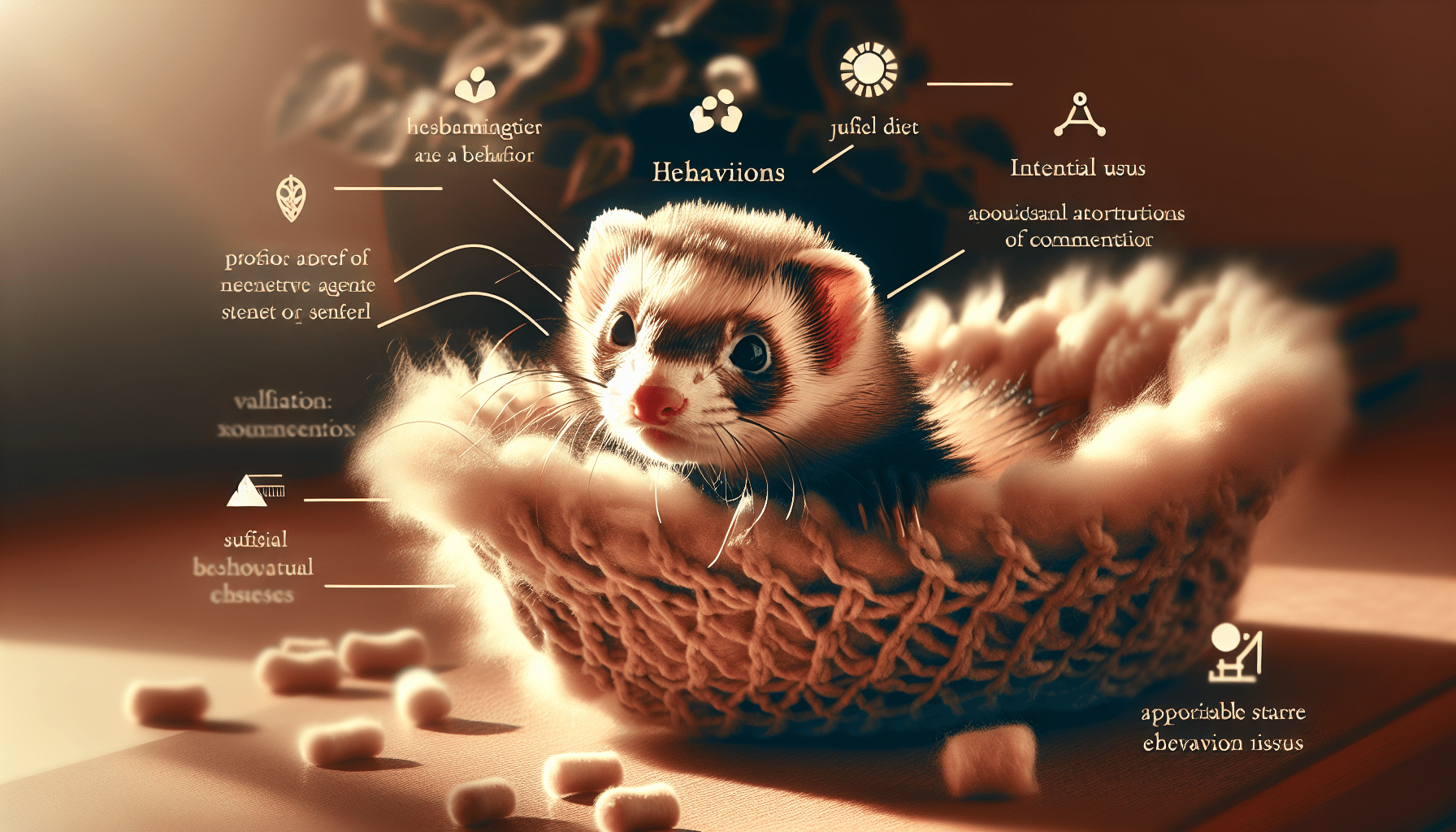Ferret Care and Behavior is an all-encompassing guide that provides everything you need to know about keeping a furry ferret friend happy and healthy. From their quirky behaviors to their unique care requirements, this article covers it all. Whether you’re a first-time ferret owner or looking to expand your knowledge, this comprehensive resource offers valuable insights and helpful tips to ensure a harmonious and fulfilling life with your mischievous little companion.
Overview of Ferrets
Physical characteristics
Ferrets, members of the mustelid family, are small domesticated carnivores known for their unique appearance and playful nature. They typically have a slender, elongated body with short legs, a long tail, and a pointed face. Their fur can come in a variety of colors and patterns, including sable, albino, silver, and cinnamon. Ferrets have a keen sense of hearing and smell, but their vision is limited. On average, they can grow to be around 15 to 20 inches long and weigh between 1 and 4 pounds.
Habitat and natural behavior
In the wild, ferrets are native to Europe, but domesticated ferrets have become popular pets worldwide. These curious creatures are highly active and require ample space to explore and play. They are notorious for their love of digging, so it’s important to create an environment that allows for this natural behavior. Ferrets are social animals by nature and often prefer the company of other ferrets or human companions. They are known for their mischievous and playful behavior, which makes them entertaining pets to have around.
Choosing a Ferret
Adopting from a shelter
By choosing to adopt a ferret from a shelter, you give a deserving animal a second chance at a loving home. Many ferrets end up in shelters due to various reasons, such as owners who could no longer care for them. When adopting a ferret, it’s essential to spend time interacting with them to ensure they are a good fit for your lifestyle. Shelters often provide valuable information about the ferret’s history, temperament, and any known health issues, which can help you make an informed decision.
Finding a reputable breeder
If you decide to get a ferret from a breeder, it’s crucial to find a reputable one who prioritizes the health and well-being of their animals. Look for breeders who provide proper care, socialization, and veterinary support for their ferrets. Reputable breeders will be transparent about their breeding practices and should allow you to visit their facility to see the conditions their ferrets are living in. Avoid purchasing ferrets from pet stores or online sellers that may not prioritize the welfare of the animals.
Considerations for owning multiple ferrets
Ferrets are social animals that often benefit from having a companion. If you are considering owning multiple ferrets, it’s important to make sure you have enough space, resources, and time to care for them properly. Ferrets enjoy interacting and playing with each other, which can help reduce boredom and loneliness. However, introducing new ferrets to one another requires careful introductions and gradual bonding to ensure they get along. It’s crucial to consider the additional responsibility and potential challenges that come with multiple ferrets.

Housing and Environment
The ideal cage
Providing a suitable cage is essential for your ferret’s well-being. Ferrets are active and need plenty of space to move around and play. The cage should be large enough to accommodate multiple levels, ramps, and hiding places. Opt for a cage made of sturdy materials, with narrow wire spacing to prevent escape or injury. It’s best to choose a cage with a solid floor to prevent paw injuries. Additionally, make sure to include ferret-safe bedding, such as fleece or towels, to create a comfortable environment for your furry friend.
Creating a safe and stimulating environment
Ferrets are curious animals that require mental and physical stimulation to thrive. Provide toys, tunnels, and interactive games to keep them entertained while in their cage. Ensure that there are no small parts or hazardous materials that they can chew on or swallow. Ferrets enjoy exploring and may even enjoy having a dedicated play area outside the cage. Baby-proofing your home and removing any potential hazards is also important to ensure their safety during supervised playtime.
Temperature and lighting requirements
Ferrets are highly susceptible to temperature extremes. They are most comfortable in temperatures between 60 and 80 degrees Fahrenheit (15 to 26 degrees Celsius). Avoid placing their cage in direct sunlight or near drafts. It’s also important to ensure proper ventilation in their living space. Providing a light source that simulates natural daylight can help maintain their internal clock and promote a healthy sleep cycle. Avoid using heat lamps or heating pads, as they can cause burns or overheating.
Feeding and Hydration
A balanced diet for ferrets
Feeding your ferret a balanced and nutritious diet is vital for their overall health. Ferrets are obligate carnivores, which means they require a diet rich in animal protein and fat. A high-quality ferret-specific diet is recommended to meet their nutritional needs. Avoid feeding them dog or cat food, as these do not provide the necessary nutrients for ferret health. It’s important to note that ferrets have a fast metabolism and require frequent small meals throughout the day.
Commercial ferret food
Commercial ferret food formulated specifically for ferrets is readily available and convenient to feed. Look for a product that lists real meat as the primary ingredient and avoids excessive fillers or grains. Dry kibble and wet canned food can both be suitable options, and some ferrets may have a preference for one over the other. Always follow the feeding guidelines provided by the manufacturer and adjust portion sizes based on your ferret’s individual needs.
Supplementing with raw meat or prey
Some ferret owners choose to supplement their ferret’s diet with raw meat or prey items to mimic their natural diet. This can be done by offering small amounts of raw chicken, turkey, or other appropriate meats. If giving raw meat, ensure it is fresh, of high quality, and handled safely to avoid bacterial contamination. Additionally, some owners choose to offer their ferrets whole prey items, such as chicks or mice. It’s crucial to research and consult with a veterinarian to ensure a balanced diet is maintained when incorporating these foods.

Grooming and Hygiene
Bathing requirements and techniques
Ferrets are naturally clean animals and do not require frequent baths. Bathing them too often can strip their skin of natural oils and cause dryness. A bath every few months or as needed is generally sufficient. Use a ferret-specific shampoo or a mild, fragrance-free shampoo formulated for sensitive skin. Fill a shallow basin or sink with lukewarm water and gently wet and lather your ferret’s fur, taking care to avoid the head and ears. Rinse thoroughly and dry them well with a towel or a low-heat blow dryer.
Nail trimming
Regular nail trimming is essential to prevent overgrowth and discomfort for your ferret. Ferret nails are transparent, making it easier to identify the quick, which is the sensitive part of the nail. Use a pair of nail clippers designed specifically for small animal use. Take care not to trim too close to the quick, as it can cause bleeding. If you are unsure or uncomfortable trimming your ferret’s nails, consult a veterinarian or a professional groomer for assistance.
Ear cleaning
Ferrets are prone to earwax buildup and infections, so routine ear cleaning is important. Gently inspect your ferret’s ears and look for any signs of redness, swelling, or excess wax. Using a ferret-safe ear cleaning solution, dampen a cotton ball or a soft cloth and gently wipe the visible parts of the ear. Avoid inserting anything into the ear canal, as this can damage their delicate ear structures. If you notice any abnormalities or your ferret shows signs of discomfort, consult a veterinarian for further evaluation.
Socialization and Training
Handling and bonding with your ferret
Ferrets are highly social animals and thrive on human interaction and companionship. Spend quality time with your ferret, allowing them to become familiar with your scent and touch. Gently handle and stroke them to build trust and establish a bond. It’s important to note that each ferret has its own personality, and some may be more resistant to handling than others. Be patient and respect their boundaries, gradually increasing the duration and intensity of interactions as they become more comfortable.
Introducing to other pets
If you have other pets in your household, introducing them to your ferret requires careful supervision and gradual introductions. Start by allowing the pets to sniff and investigate each other’s scent through a closed door or a barrier. Gradually progress to supervised, controlled meetings in a neutral area, such as a playpen or a separate room. Always monitor interactions closely and be prepared to intervene if there is any aggression or excessive fear displayed by either party.
Basic obedience training
Although not as trainable as dogs, ferrets can still learn basic commands and behaviors. Positive reinforcement training techniques, such as using treats and praise, can be effective in teaching them simple commands like “come” or “stay.” Keep training sessions short and engaging to maintain your ferret’s interest. Consistency and patience are key when training ferrets, and it’s essential to remember that they have their limitations and may not respond in the same way as other pets.
Healthcare and Veterinary Needs
Vaccinations and preventive care
Ferrets require regular veterinary care to ensure they stay healthy and protected against common diseases. One of the most important preventive measures is the administration of vaccinations, including distemper and rabies vaccines. These vaccinations help prevent highly contagious and potentially fatal illnesses in ferrets. Regular wellness check-ups are also important for monitoring their overall health and addressing any concerns or issues promptly.
Common health issues and their symptoms
Like any pets, ferrets can experience various health issues throughout their lives. Some common health problems in ferrets include gastrointestinal disorders, dental disease, adrenal disease, and insulinoma. It’s important to be familiar with the symptoms of these conditions, which can include weight loss, lethargy, hair loss, diarrhea, or difficulty breathing. Prompt veterinary attention is crucial if you notice any signs of illness or unusual behavior in your ferret.
Finding a ferret-experienced veterinarian
When selecting a veterinarian for your ferret, it’s essential to find one with experience and knowledge in treating these unique creatures. Not all veterinarians are familiar with the specific needs of ferrets, so it’s important to do your research and find a vet who has experience with exotic pets or specializes in ferret care. They should be able to provide routine care, perform necessary procedures, and offer guidance on nutrition, behavior, and overall well-being.
Understanding Ferret Behavior
Exploring natural instincts and behaviors
Understanding the natural instincts and behaviors of ferrets is crucial in providing them with an enriching and stimulating environment. Ferrets are natural hunters and have a strong inclination to dig, hide, and explore. Providing appropriate toys, tunnels, and opportunities for play can help satisfy these instincts and prevent boredom. Ferrets are also crepuscular, meaning they are most active during dawn and dusk, so be prepared for bursts of activity during these times.
Play and exercise needs
Ferrets are highly energetic animals and require plenty of physical activity to stay happy and healthy. Providing opportunities for daily play and exercise is essential. Interactive toys, tunnels, and obstacle courses can help provide mental stimulation and encourage physical movement. Allocating dedicated playtime outside of their cage allows them to stretch their legs and explore their surroundings safely. Always supervise your ferret during playtime to ensure their safety and prevent any accidental injuries.
Signs of stress or illness
Ferrets, like any animals, can experience stress or illness that may manifest in various ways. Signs of stress in ferrets can include excessive scratching or grooming, loss of appetite, hair loss, or changes in behavior. It’s important to monitor your ferret closely and look out for any changes in their normal routine or behavior. If you notice any signs of distress or suspect your ferret is unwell, consult a veterinarian for a proper evaluation and treatment.
Reproductive Care
Spaying and neutering
Spaying or neutering your ferret is highly recommended unless you have specific plans to breed them responsibly. Spaying, the removal of the female’s reproductive organs, helps prevent life-threatening conditions such as uterine infections and certain types of cancers. Neutering, the removal of the male’s testes, helps prevent the strong odor associated with intact males and reduces aggression. It’s important to consult with a veterinarian to discuss the best age and timing for the procedure.
Breeding considerations
Breeding ferrets requires careful planning, knowledge, and a commitment to responsible ownership. Breeding should only be done with healthy ferrets that meet breed standards and have been thoroughly evaluated for potential genetic issues. Breeding without proper knowledge and understanding of the process can put stress on the female ferret’s health and potentially contribute to overpopulation and the welfare issues associated with unwanted litters. If you are considering breeding ferrets, it’s essential to seek guidance from experienced ferret breeders or veterinarians.
Caring for pregnant and nursing females
If you have a pregnant or nursing female ferret, it’s vital to provide the necessary care and support. Pregnant ferrets should have a comfortable and secure nesting area where they can give birth and care for their young. Their diet may need adjustment to meet the increased nutritional demands during this time. It’s important to monitor the female closely for any signs of complications or difficulties during the birthing process and consult a veterinarian if needed.
Traveling with Ferrets
Preparing for trips
Traveling with ferrets requires careful planning and preparation to ensure their safety and comfort. Ensure that your ferret is up to date on vaccinations and carries proper identification, such as a microchip or a collar with tags. Pack a travel kit that includes essential supplies, such as food, water, treats, a comfortable carrier, bedding, and any necessary medications. Familiarize your ferret with the carrier gradually before the trip to reduce anxiety during the journey.
Carrier and transportation options
Choosing an appropriate carrier is crucial for safe travel with your ferret. Opt for a carrier specifically designed for small animals, with secure latches and proper ventilation. Soft-sided carriers made of sturdy materials can provide comfort and be easier to handle. Ensure the carrier is well-padded with absorbent materials, such as towels or fleece blankets, to provide a cozy space for your ferret. When traveling by car, secure the carrier to prevent movement or shifting during the journey.
Considerations for international travel
If you plan to travel internationally with your ferret, it’s essential to research and comply with the specific regulations and requirements of the destination country. Some countries have strict quarantine periods or may require additional documentation or vaccinations. It’s crucial to start the planning process well in advance to allow for any necessary procedures or tests. Consulting with a veterinarian and contacting the appropriate authorities are important steps to ensure a smooth and stress-free international travel experience for your ferret.
In conclusion, ferrets are fascinating and entertaining pets that bring joy to many households. By understanding their physical characteristics, habitat, and natural behaviors, you can provide a suitable environment for them to thrive. Whether adopting from a shelter or seeking a reputable breeder, careful consideration should be given to choosing a ferret that fits your lifestyle. From providing ample space and stimulating toys to maintaining a balanced diet and regular grooming, meeting the needs of your ferret requires dedication and responsible ownership. Regular veterinary care, knowledge of ferret behavior, and awareness of their reproductive care are all essential aspects of providing optimal care for your furry friends. And when it comes time to travel, proper preparation and consideration of their needs will ensure a safe and enjoyable journey for both you and your ferret. With love, attention, and proper care, your ferret can bring years of companionship and happiness into your life.
